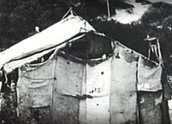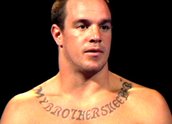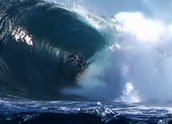


Bra Boys (2007)
Synopsis
This is an insider account of surf culture, localism, belonging and loyalty in the Sydney beach suburb of Maroubra, presented by the 'Bra Boys’, in particular the Abberton brothers – Koby, Sunny and Jai. The documentary is filmed during the period that Jai was charged with murder and Koby charged with being an accessory after the fact. The film features interviews with several members of this urban subculture as well as insights from those associated with broader surfing culture. It incorporates professional surfing footage, news film, photographs and historical material. Key segments include contextual voice-over narration by actor Russell Crowe.
Curator’s notes
Bra Boys was written, produced and co-directed by Sunny Abberton and filmed between 2003 and 2006. A low-budget, independently funded production, members of the Bra Boys filled multiple roles on the crew, including Macario De Souza who edited the film in his bedroom in Maroubra and assisted with cinematography, direction, sound and graphics.
As an insider account, Bra Boys offers a subjective view of the social and cultural events that have shaped a generation of young men growing up in Sydney’s beachside suburb of Maroubra. It is unapologetic about the antisocial behaviour that group mentality and machismo can trigger and doesn’t shy from depicting violence, conflict and uneasy relationships with authority.
Bra Boys was released when the fallout from the December 2005 Cronulla riots was still a hot topic of conversation. Identity politics, issues of race and 'Australianness’ emerged in debates about nationalism across the country and the then Howard Government’s new citizenship test (announced a year to the day after the riots) placed migration policy firmly on the political agenda. In addition to this, comments in the press from Russell Crowe prior to the film’s release also increased interest. Initially credited as executive producer, Crowe insisted on only a narrator credit, saying that he did not financially invest in the film and provided the voice-over for free. Crowe’s association with the film added to the whirlwind of publicity whipped up against the backdrop of the political climate. No doubt these factors helped Bra Boys to its record-breaking opening weekend at the box-office.
The film’s narrative structure is at times difficult to navigate, partly due to Sunny’s dual role as a subject and first-time filmmaker. But Bra Boys is nevertheless an exciting ride. The raw material of the film has been loosely shaped and is pulled together through intermittent background sections narrated by Russell Crowe. These provide important historical information but are in themselves less vibrant than the rest of the film (see clip one). It is clear that a passion to tell their side of the story is what motivated Sunny to make Bra Boys, and this makes for a subjective perspective. Sunny uses home movie-style camcorder footage of the boys on the streets and elicits candid interviews with key members of the group, especially his brother Koby, a fascinating and engaging subject and the film’s pivotal character.
So Bra Boys is a first hand perspective on localism and tribalism, in particular localism’s importance in the formation of identity and belonging. The film successfully challenges some of the media stereotypes associated with the region by highlighting the Bra Boys’ role as mediators during the 2005 Cronulla riots (which occurred while Bra Boys was still in production) and making a point of the ethnic diversity within the group itself. By doing this, the film suggests that it is their common social backgrounds as well as pride in their locality that informs their group identity, not a racist notion of nationalism as has sometimes been implied. Bra Boys is at its heart a tale of social cohesion in the midst of dysfunction and a fraternal letter of love and gratitude from Sunny Abberton to the shaping forces in his own life – his brothers and his Bra Boys.
Bra Boys had its national theatrical release on 15 March 2007. The film broke box-office records and, as at 2008, is the most successful non-IMAX Australian documentary grossing over $1,600,000 AUD. On the back of the film’s success, Koby Abberton attracted lucrative sponsorship deals and a Hollywood feature film, based on the documentary, is slated for production.
- Overview
- Curator’s notes
- Video 3 clips

- Principal credits
- Find a copy
- Make a comment
- Map
- Add your review



